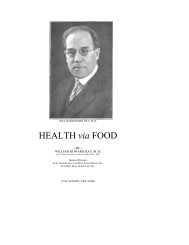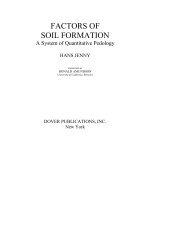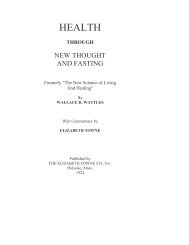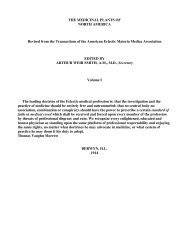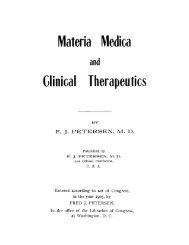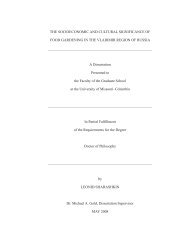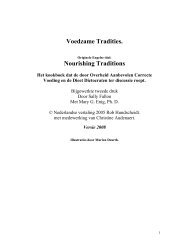- Page 2 and 3: What Really Causes Alzheimer’s Di
- Page 4 and 5: Dedicated to Grey Friar’s Bobby i
- Page 6 and 7: ACKNOWLEDGEMENTS The unusual cover
- Page 8 and 9: WHAT REALLY CAUSES ALZHEIMER’S DI
- Page 10 and 11: mutations involved in promoting the
- Page 14 and 15: poor source of minerals, such as ca
- Page 16 and 17: 17. Flaten, T.P. (1990). Geographic
- Page 18 and 19: TABLE OF CONTENTS 1 Who Was I? ....
- Page 20 and 21: WHO WAS I? 1 LEAR: FOOL: Does any h
- Page 22 and 23: population. 8-9 David Shenk, 10 in
- Page 24 and 25: saw this as a death sentence. “Te
- Page 26 and 27: patients deteriorate. That is, the
- Page 28 and 29: REFERENCES 1. Henderson, A.S. (1986
- Page 30 and 31: 35. Garruto, R.M., Swyt, C., Yanagi
- Page 32 and 33: IN THE BEGINNING: A HISTORY 2 I am
- Page 34 and 35: In 1901 there was certainly nothing
- Page 36 and 37: falciparum, which causes malaria, a
- Page 38 and 39: techniques, medical researchers mus
- Page 40 and 41: USA age-adjusted mortality rates fo
- Page 42 and 43: 14. Chiu, H.F.K., and Zhang, M. (20
- Page 44 and 45: THE BRAIN DRAIN: PATHOLOGY AND GENE
- Page 46 and 47: with other threads of tau and becom
- Page 48 and 49: The most extreme of the geneticists
- Page 50 and 51: SUMMARY Major pathologic changes oc
- Page 52 and 53: PUTTING THE DISEASE IN ITS PLACE 4
- Page 54 and 55: smoking, over-consumption of alcoho
- Page 56 and 57: eported more commonly from Russia,
- Page 58 and 59: These differences in the spatial di
- Page 60 and 61: years and older, the dementia preva
- Page 62 and 63:
REFERENCES 1. Hippocrates On Airs,
- Page 64 and 65:
Alzheimer’s disease in two commun
- Page 66 and 67:
BIOCHEMICAL ABNORMALITIES 5 What we
- Page 68 and 69:
aspartate, normally exist in low co
- Page 70 and 71:
types of glutamate receptors in the
- Page 72 and 73:
There is also growing evidence that
- Page 74 and 75:
of Alzheimer’s disease and so res
- Page 76 and 77:
SUMMARY It is apparent from this sh
- Page 78 and 79:
14. Kirschmann, J.D. with Dunn, L.J
- Page 80 and 81:
39. Symons, M.C.R., and Gutteridge,
- Page 82 and 83:
OTHER RISKS, FURTHER HAZARDS 6 I ca
- Page 84 and 85:
Cholesterol Whether or not high cho
- Page 86 and 87:
Homocysteine The essential amino ac
- Page 88 and 89:
placebos. As has been described ear
- Page 90 and 91:
may be stronger in women. Gustafson
- Page 92 and 93:
disease. The first of these followe
- Page 94 and 95:
Head Trauma Controversy continues o
- Page 96 and 97:
Osteoporosis A recent longitudinal
- Page 98 and 99:
Aging If, as has been previously ar
- Page 100 and 101:
REFERENCES 1. Fotuhi, M. (2003). Th
- Page 102 and 103:
25. Lim, G.P., Chu, T., Yang, F., B
- Page 104 and 105:
54. Ibid. 55. Wilson, R.S., Barnes,
- Page 106 and 107:
78. D’Alessandro, R., Gallassi, R
- Page 108 and 109:
DOWN TO EARTH: LOCATION, LOCATION,
- Page 110 and 111:
oad salt was used extensively and s
- Page 112 and 113:
of aluminum and potassium) to staun
- Page 114 and 115:
that, within psychiatric nursing ho
- Page 116 and 117:
The importance of monomeric (single
- Page 118 and 119:
would also promote this form of dem
- Page 120 and 121:
correctly able to identify whether
- Page 122 and 123:
and teeth. As a consequence, under
- Page 124 and 125:
and coworkers 82 also established t
- Page 126 and 127:
17. Crapper, D.R., Krishnan, S.S.,
- Page 128 and 129:
45. Perl, D.P., and Good, P.F. (198
- Page 130 and 131:
78. Jacqmin, H., Commenges, D., Let
- Page 132 and 133:
CHECKING OUT ALTERNATIVES 8 Knowing
- Page 134 and 135:
in Japan, China, and Korea. Some of
- Page 136 and 137:
All appear favourable and Galantami
- Page 138 and 139:
changes. These observations may exp
- Page 140 and 141:
and behaviour. The reason for this
- Page 142 and 143:
15. Thal, L.J., Salmon, D.P., Laske
- Page 144 and 145:
43. Pettegrew, J.W., Klunk, W.E., P
- Page 146 and 147:
CONVENTIONAL MEDICAL WISDOM 9 We’
- Page 148 and 149:
expected, a deficiency of this neur
- Page 150 and 151:
There may be a case for the use of
- Page 152 and 153:
of Alzheimer’s patients. 28 Birks
- Page 154 and 155:
M., Thomas, R., and Thal, L.J. (200
- Page 156 and 157:
BACK FROM THE ABYSS 10 Abide with m
- Page 158 and 159:
Louis Blank could no longer recogni
- Page 160 and 161:
UNDERSTANDING THE SYSTEM: DEMENTIA
- Page 162 and 163:
gene that is responsible. 3 There i
- Page 164 and 165:
misfolded proteins that have the un
- Page 166 and 167:
those who do not carry the APO E4 a
- Page 168 and 169:
REFERENCES 1. Hoffman, R. (2003). W
- Page 170 and 171:
IT TAKES TWO (OR MORE) TO TANGO 12
- Page 172 and 173:
and increased risk for cardiovascul
- Page 174 and 175:
of drinking water and this form of
- Page 176 and 177:
These high levels of aluminum were
- Page 178 and 179:
acid and elevated aluminum. 40 Unde
- Page 180 and 181:
accompanied by a build-up of both b
- Page 182 and 183:
11. Bishop and Waldholz, op. cit. 1
- Page 184 and 185:
changes in calmodulin-implications
- Page 186 and 187:
A BARRIER TO ANTAGONISM 13 It all l
- Page 188 and 189:
aluminum enters neurons and alone i
- Page 190 and 191:
It is at this level that the geneti
- Page 192 and 193:
REFERENCES 1. Koestler, A. (1959).
- Page 194 and 195:
OTHER ENZYMES - FURTHER PROBLEMS 14
- Page 196 and 197:
mechanisms for triggering and direc
- Page 198 and 199:
of the phospholipids that concentra
- Page 200 and 201:
neurofibrillary tangles of Alzheime
- Page 202 and 203:
REFERENCES 1. Heinlein, R. cited by
- Page 204 and 205:
lets of patients with Alzheimer’s
- Page 206 and 207:
THE ACID TEST: DO THE PIECES FIT? 1
- Page 208 and 209:
Table 1: The Pieces of the Jigsaw P
- Page 210 and 211:
Chapter 8. Checking Out Alternative
- Page 212 and 213:
Alzheimer’s patients are very glu
- Page 214 and 215:
There is no doubt that, globally, s
- Page 216 and 217:
genetic aberration can remove beta-
- Page 218 and 219:
also that diabetics would benefit f
- Page 220 and 221:
We do not need a giant, time wastin
- Page 222 and 223:
Table 2: Alzheimer’s Disease and
- Page 224 and 225:
this process occurs more slowly if
- Page 226 and 227:
patients. 83 It has been establishe
- Page 228 and 229:
sampled materials established that
- Page 230 and 231:
damage before Alzheimer’s symptom
- Page 232 and 233:
Not only is the aluminum burden of
- Page 234 and 235:
phosphofructokinase. All the necess
- Page 236 and 237:
REFERENCES 1. Brown, S.R. (2003). S
- Page 238 and 239:
27. Kawahara, M., Kato, M., and Kur
- Page 240 and 241:
adenylate cyclase, guanylate cyclas
- Page 242 and 243:
adrenergic hypersensitivity and emo
- Page 244 and 245:
115. Marlowe, M., and Bliss, L.B. (
- Page 246 and 247:
GOOD-BYE TO THE LONG GOOD-BYE 16
- Page 248 and 249:
It would seem to be in the best int
- Page 250 and 251:
cancer, and diabetes mellitus. 16 S
- Page 252 and 253:
in the Developed World, by governme
- Page 254 and 255:
poor source of minerals, including
- Page 256 and 257:
SUMMARY There is currently a global
- Page 258 and 259:
25. Peak Performance, op.cit. 26. L
- Page 260 and 261:
A Index A1-calmodulin complex 159 a
- Page 262 and 263:
lood pressure 63-66, 80-81, 208 blo
- Page 264 and 265:
E Early Onset Alzheimer’s disease
- Page 266 and 267:
hardening of the arteries 7 harmful
- Page 268 and 269:
miners 97, 108 MIRAGE 74, 85, 223 M
- Page 270 and 271:
etired 1 retrogenesis vii-viii, 2-3
- Page 272 and 273:
vitamin B 12 67, 70, 147, 203 vitam
- Page 274 and 275:
of the boards of the Journal of Ort



